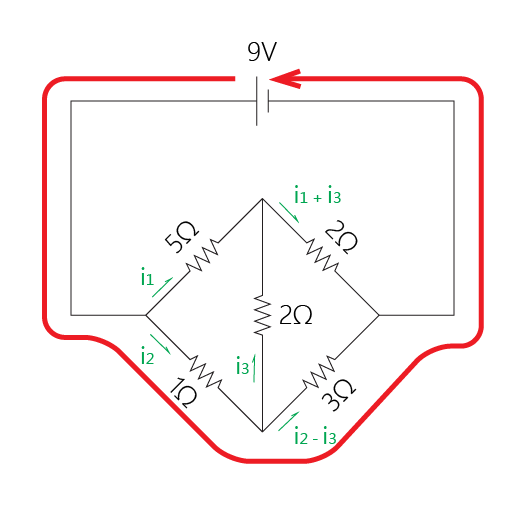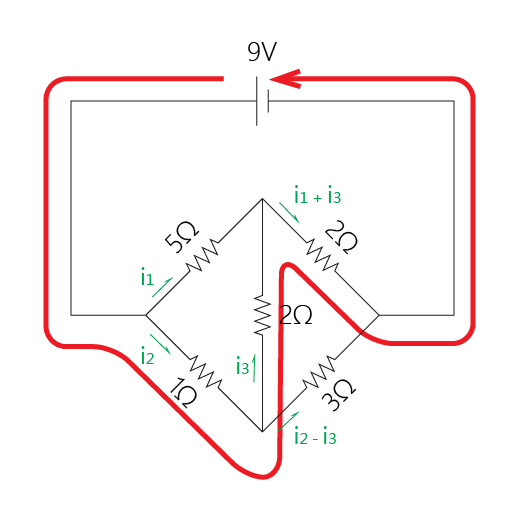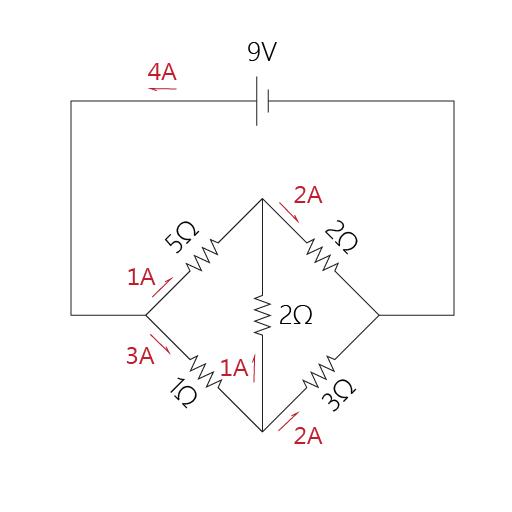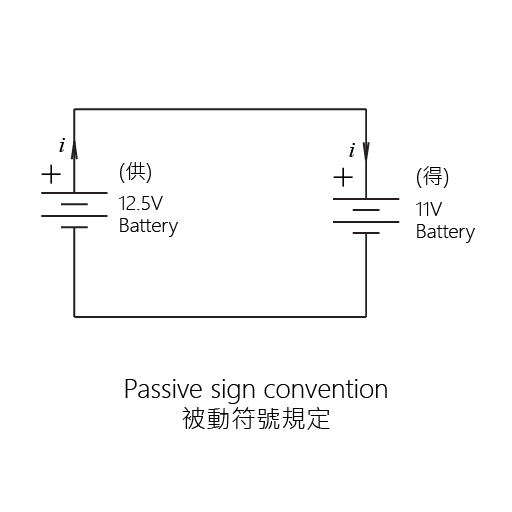Wheatstone bridge 中文名稱
惠斯通電橋
惠斯登電橋
惠斯同電橋

My Notebook
惠斯通電橋
惠斯登電橋
惠斯同電橋

資料來源:侯天同
丁丑年 丙午月 甲辰日 乙丑時
乙甲丙丁
丑辰午丑
己丑年 癸酉月 甲子日 辛未時
辛甲癸己
未子酉丑


電池電壓 – 5Ω電阻電壓 – 2Ω電阻電壓 = 0V
公式1:9 – i₁x 5 -(i₁ + i₃) x 2 = 0

公式2:9 – i₂ x 1 – (i₂ – i₃) x 3 = 0

公式3:9 – i₂ x 1 – i₃ x 2 – (i₁ + i₃) x 2 = 0

公式1:9 – i₁ x 5 -(i₁ + i₃) x 2 = 0
公式2:9 – i₂ x 1 – (i₂ – i₃) x 3 = 0
公式3:9 – i₂ x 1 – i₃ x 2 – (i₁ + i₃) x 2 = 0
化解公式1:9 – 7i₁ – 2i₃ = 0
化解公式2:9 – 4i₂ + 3i₃ = 0
化解公式3:9 – 2i₁ – i₂ -4i₃ = 0
公式1: (9 – 7i₁) = 2i₃
公式2: (4i₂ – 9) = 3i₃
公式3:(9 – 2i₁ – i₂) = 4i₃
(公式1 x 2) – (公式3) = 0
2(9 – 7i₁) – (9 – 2i₁ – i₂) = 0
18 – 14i₁ – 9 + 2i₁ + i₂ = 0
9 – 12i₁ + i₂ = 0
公式4: 12i₁ – 9 = i₂
(公式1 x 3) – (公式2 x 2) = 0
3(9 – 7i₁) – 2(4i₂ – 9) = 0
27 – 21i₁ – 8i₂ + 18 = 0
45 – 21i₁ – 8i₂ = 0
公式5: 45 – 21i₁ = 8i₂
(公式4 x 8) – (公式5) = 0
8(12i₁ – 9) – (45 – 21i₁) = 0
96i₁ – 72 – 45 + 21i₁ = 0
117i₁ – 117 = 0
117i₁ = 117
結果:i₁ = 1A
i₁ = 1A, i₂ = 3A, i₃ = 1A


Kirchhoff’s circuit law 第一定律: Kirchhoff’s current law
即電路中的各個節點的電流總流入和總流出的電流量必須是相同。
流入(I) = 流出(I)
Σ IIN = Σ IOUT

(a) I1 + I4 + I5 = I2 + I3
Source: https://www.youtube.com/watch?v=mH-XUGkNohM
Source: https://www.youtube.com/watch?app=desktop&v=II2nDdt4uX0
在電氣工程中,(被動符號規定 PSC)是電氣工程界普遍採用的用於定義電路中電源符號的符號約定或任意標準規則。
重點:用符號分別元件是「供」還是「得」






KessV2
K-Tag
Ecutek
TL494
IR2110
– Performance remap
– 50/50 remap
– Economy remap
– Launch Control (where available)
– Popcorn Limiter/Hard Cut Limiter (Where available)
– DPF delete
– EGR delete
– VAG Hot start problems
– Speed limiter
– Lamda delete
– pop and bang /overrun
Pros:
Have automatic DPF OFF, EGR OFF etc
make good axis (ads factors etc.)
Easy to use
Cons:
Does not find all maps.
The newer auto is the less maps. I have used swiftec in by my friends and in autos abowe 2012 many maps he has to look manually.
Pros:
Find almost all maps for all cars
Not as easy as Swiftec but still easy to use
Cons:
does not edit Axis and does not add factor (have to add it manually)
Does not do EGR OFF
Does not do DPF OFF
Pros:
You can buy almost every ECU damos
If You have damos then You know that You have all maps (not as in Swiftec)
Its more professional
Cons:
You have to find maps manually without damos
You have to buy every damos which in long term will cost more then Swiftec or ECM.
Does not do DPF EGR automaticly
source : https://www.digital-kaos.co.uk/forums/showthread.php/666402-ECM-Titanium-vs-Swiftec-vs-Winols
348 GTS/GTB/Spider (3.4 V8 -320 Hp)
355 GTS/GTB/Spider (3.5 v8 – 380 Hp)
360 Modena/Spider (1999-2024) (3.6 V8 – 401 Hp)
456 (5.5 v12 – 428 Hp)
458 Italia (4.5 V8 – 570 Hp, 4.5 V8 Speciale – 605 Hp, Challenge V8 (Track Only – 570 Hp) )
488 GTB/Spider (2015 – .) (3.9 V8 Bi – 670 Hp)
512TR (5.0 v12 – 428 Hp)
599 GTB (6.0 v12 – 620 Hp)
599 GTO (6.0 v12 – 670 Hp)
612 Scaglietti (V12 – 540 Hp)
California (3.9 V8 Turbo – 560 Hp, 4.3 V8 – 460Hp)
Enzo (2002 > 2004) (6.0 V12 – 660 Hp)
F12 (2012 – ..) (6.3 V12 – 740 Hp)
F150 (2013 – ..) (6.3 V12 – 950Hp), (2017 > ..)(3.5T V6 Ecoboost – 370Hp, 3.5T V6 Raptor – 450 Hp)
F430 (10/2004 – ..) (4.3 V8 – 490 Hp, 4.3 V8 – 510 Hp)
FF (2011 – ..) (6.2 V12 – 660 Hp)
GTC 4 Lusso (2016 ->..)(3.9 V8 Bi-Turbo – 610 Hp, 6.3 V12 – 690 Hp)
La (6.3i V12 – 963 Hp)
M575 (5.8 v12 – 515 Hp)
Aventador (6.5 V12 – 700Hp)
Gallardo (COUPE 500Hp, LP 530 530Hp, LP 550 550Hp, LP 560 560Hp, LP 570 570Hp, SESTO ELEMENTO 570Hp, SPYDER 520Hp, SUPERLEGGERA 530Hp)
Huracan
Murcielago
911
Boxster
Carrera GT
Cayenne
Cayman
Macan
Panamera